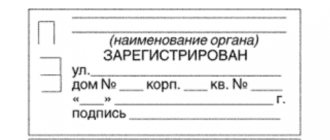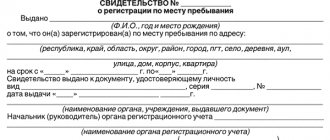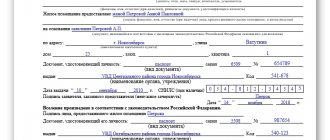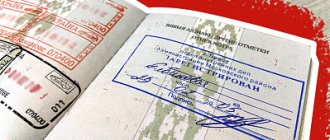You can find out whether you can register in a dacha or in a village and SNT, as well as in an apartment or loft and in a communal apartment, and how to do this on our website.
Types of citizen registration
The main difference in residence permit and registration is that in the first case a person does not have the right to move freely around the country, but in the second case the citizen is completely free to move.
There are two types of registration:
- Permanent (at place of residence). It is stamped in the passport, valid for an indefinite period, and carried out at the place of permanent residence.
- Temporary (at the place of stay). The person is given a certificate; the registration itself is valid for no more than 5 years.
A temporary option is necessary to register a person at his place of stay, where he will be staying for a short time. At the same time, permanent registration is not cancelled.
The difference between registration and temporary registration is the validity period. Registration is a permanent registration at the place of residence, which is carried out by the owners of the living space and is marked in the passport.
Regulations
The main legislative act regulating both concepts of registration is the Federal Law “On the right of citizens of the Russian Federation to freedom of movement, choice of place of stay and residence within the Russian Federation” . This regulatory act defines the rights of citizens to freedom of movement, without restrictions, as well as the right to independently choose their place of residence and registration.
The Law on Registration and Registration 2017 establishes the requirement for temporary or permanent registration when changing the place of residence of the subject.
Federal Law No. 376-FZ “On Amendments to Certain Legislative Acts of the Russian Federation” provides for penalties for issuing fictitious registrations. Any citizen must be registered (including temporarily), even where he actually lives.
Article 20 of the Civil Code of the Russian Federation defines the place of residence of a citizen.
Features of permanent registration
Permanent registration gives the right to reside at a specific address, which is noted in the citizen’s passport.
A person with such a stamp at a certain address has the following advantages:
- a citizen registered in a given territory can become a participant in the privatization process if the housing is municipal;
- has the right to express his opinion regarding the registration of other persons in this living space;
- the opportunity to provide permanent residence registration for friends and relatives at this address.
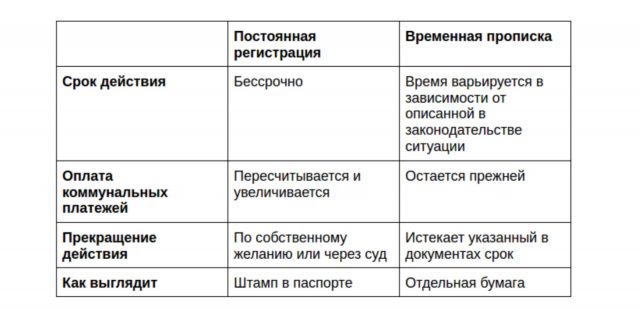
If a person is permanently registered in a city of federal significance, then he can stay in the corresponding region without temporary registration for longer than 90 days.
Registration and registration are the same thing
In fact, both of these concepts are synonymous with obtaining the right to housing, and if in Soviet times registration was a more popular phenomenon, modern legislation requires the use of “registration at the place of residence.”
Replacement with registration Ten years ago, registration replaced registration and is rather a fundamentally different procedure, which is not so much of a permitting, but of a notification nature. No. 677 “On approval of the Regulations on the passport system in the USSR” it was established that citizens were registered at their place of residence. At the same time, it was established that “citizens changing their place of residence, as well as leaving for a period of more than one and a half months, except for those leaving on business trips, vacations, to the country, for rest or treatment, are required to be discharged before leaving.”
Design rules
To obtain permanent registration, you must go to the passport office at your new place of residence with a full package of documents. You must first check out from your previous place of residence. It is acceptable for the passport office to issue a visa from your previous place of residence. If employees of this institution refuse to do this on their own, then their actions are illegal.
At the passport office you need to fill out an application on form No. 6. They can register in 1 day if the citizen was discharged from his previous place of residence in advance. If not, the period may take up to two weeks.
How is registration different from registration? Features and Requirements
Basically, that's all. You can also ask the owner to attach a copy of the certificate of ownership of the apartment, as well as copies of an identification document. With the above list of documents, contact the Federal Migration Service of your area. And in about 3 days you will receive a certificate of temporary registration.
But permanent registration, as a rule, is allowed only on the territory of a home that is someone else’s property. More precisely, either in a house or in an apartment. In municipal institutions, boarding houses and other “night shelters” it is impossible to constantly “observe”. Such rules are in force in Russia at the moment. So the differences are already visible. But this is just the beginning.
Required Documentation
In addition to the application, you must submit the following documents:
- passport of a citizen of the Russian Federation;
- birth certificate for children under 14 years of age;
- a document confirming ownership of the property;
- contract basis: inheritance document, purchase and sale agreement, transfer as a gift;
- If you checked out in advance, you will need a departure slip.
The passport office employee must check the presence of all necessary documents and pick up the passport to make the appropriate entry.
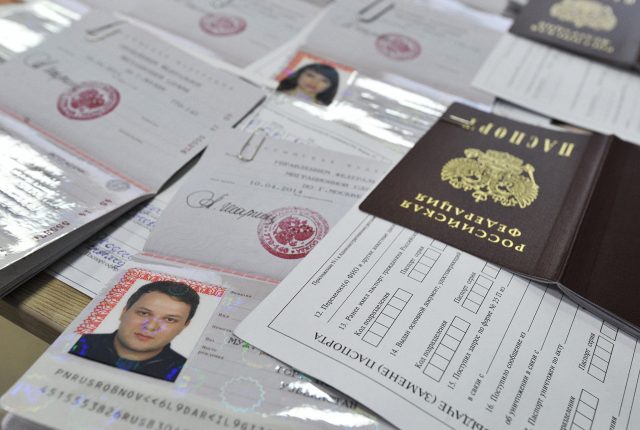
What is registration
At the place of stay or residence, in order to ensure the exercise by citizens of rights and freedoms, as well as the fulfillment of duties to other citizens, the state and society, registration of citizens within the country is carried out.
Registration of citizens at the place of residence or temporary stay is carried out in the manner established by the Rules (approved by Decree of the Government of the Russian Federation No. 713, as amended on May 25, 2021).
The place of residence is considered to be a house, apartment, or other residential premises where a person lives permanently or most of the time, being the owner, or under the terms of a rental agreement (sublease), or other legal grounds.
The procedure for registering at the place of residence is significantly simplified compared to obtaining a residence permit. In addition, both temporary and permanent registration are carried out by internal affairs bodies completely free of charge. Having permanent registration in a residential area in Moscow, St. Petersburg, Sevastopol, while staying respectively in the Moscow, Leningrad region or in any locality of the Republic of Crimea, it is not necessary to obtain temporary registration.
The law obliges citizens who change their place of residence within a week from the date of arrival at their new place of residence to submit documents and a written application in the prescribed form to the registration authority.
The registration process itself does not exceed three days from the date of submission of properly executed documents. If a person is going to register in a residential premises that does not belong to him by right of ownership, on the basis of a purchase and sale agreement, inheritance law, exchange, it is necessary to obtain consent:
- owner of the apartment (house);
- if we are talking about municipal premises - the main tenant and the citizens living with him;
- a legal entity that is the owner of the housing stock.
Some nuances that are worth paying attention to!
For example, you are registered at your parents’ address and purchased an apartment. Your right remains to re-register or remain registered at your actual residence address (with your parents) and dispose of the property at your own discretion.
Basic provisions of temporary registration
Temporary registration is carried out at the place of stay and must be recorded no later than 3 months after the move. Otherwise, it is an administrative offense with a fine.
Advantages and disadvantages
Temporary recording has a number of advantages:
- quickly processed;
- you can officially get a job;
- You can reduce the cost of utility bills at your place of permanent residence.
But temporary registration also has a number of disadvantages:
- it is impossible to obtain an insurance policy if a citizen is registered but not employed;
- You cannot get a mortgage loan;
- there is no access to the full list of government services.
If there is a certificate, a citizen has the opportunity to register a minor there without the consent of the owners.
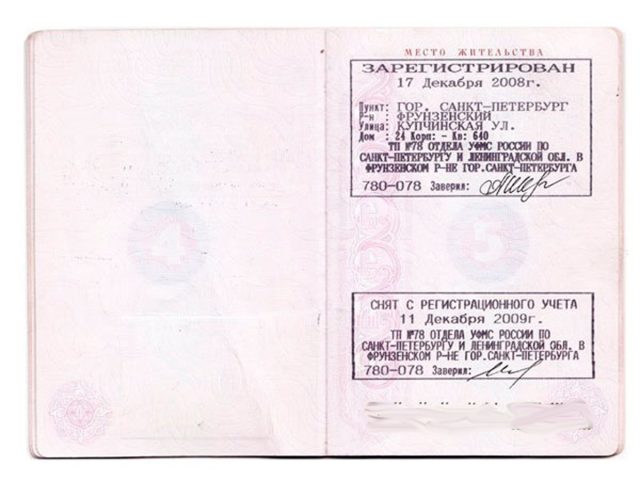
How to apply
For registration, you must provide the following documents to the passport office:
- application form;
- copy of the passport;
- arrival slip;
- owner's consent to registration;
- a document confirming the owner's rights to this premises.
After checking all the documents, the applicant will be issued a certificate of temporary registration. This requires a maximum of 3 days.
Rights and obligations
Newly registered citizens are required to pay utility bills and maintain the property of the owners in order.
A citizen receives the following rights:
- you can complete all the documentation that a person needs at the moment;
- allowed to issue loans and credits;
- receiving social benefits;
- you can enroll your children in school and kindergarten;
- You can take part in the process of privatization of premises on the territory of which the citizen is registered.
Banks do not really trust citizens with temporary registration, so getting a consumer loan is theoretically possible, but quite difficult.
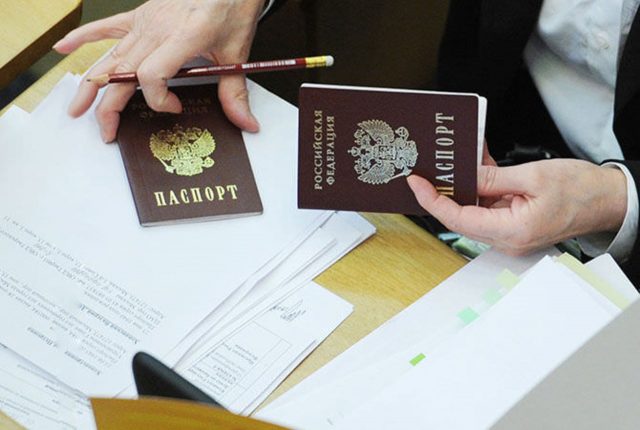
Validity
For foreign citizens, the period of temporary registration should be no more than 1 year. For citizens of the Russian Federation – maximum 5 years.
The main differences between registration and registration
Now the term “registration” is not used in the legislation of the Russian Federation. The requirement for an extract when leaving for any locality for a period of more than 1.5 months has also been abolished. Instead of registration, there is the term “registration at the place of residence,” and the term “registration at the place of temporary residence” has remained unchanged.
There are some contradictions between law and practice. Given the exclusively notification nature of registration, in fact:
- the lack of registration today, just like the lack of registration in the past, is sometimes the reason for refusal when trying to get a job;
- untimely registration entails an administrative fine;
- without registration, as without registration, you will not receive social benefits and free services in hospitals and clinics;
- Registration and registration are needed to carry out legally significant actions - buying and selling, writing deeds of gift and wills, acquiring individual entrepreneur status and participating in the creation of legal entities.
How to change temporary registration to permanent
To change temporary registration to permanent registration in the same housing, it is necessary that the applicant has rights to this territory.
If, during the privatization process, the temporarily registered person became one of the owners of the apartment, then after receiving the relevant document in hand, you must contact the passport office, write an application, provide all the papers and wait for the coveted stamp to be placed in the passport.
Since the same address cannot have both registrations at the same time, as soon as the applicant is issued a passport with a registration stamp, his certificate of non-permanent registration becomes invalid.
According to the constitution, citizens of the Russian Federation have the right to move freely throughout the country. But at the same time, it is important that they comply with the law and undergo the registration procedure at the place of stay where they have been staying for more than 3 months. Otherwise, a fine is provided for individuals and legal entities. Owners of housing where an unregistered resident lives may also suffer. To obtain a temporary or permanent residence permit, you must contact the passport office with documents confirming the right to register in this territory.
Differences
What is the difference between the two types of registration? A fairly common question, especially for people preparing to move.
- Temporary registration is a more simplified procedure in terms of registration.
As soon as its term comes to an end, it is automatically terminated; no further action is required.
- Permanent registration is characterized by strict requirements for meeting deadlines, obtaining stamps in the passport, etc.
What is the difference between the two types of registration:
| General information | Constant | Temporary |
| Time of action | Indefinitely | In practice - no more than five years or as agreed with the property owner |
| When should it be submitted? | No later than 7 days | Within 90 days |
| Required documents to fill out | Application f.6 , signed by the applicant and the person providing housing | Statement f.1 , signed by both the owner of the property or the tenant |
| Personal presence of all co-owners of the housing provided | Necessarily | Not required |
| Registration result | Stamp in the passport | Registration certificate |
Thus , temporary and permanent registration are different things that have certain legal requirements.
For foreign citizens
The main rule that foreign citizens must follow is to promptly notify the migration service of their arrival on the territory of the Russian Federation.
The period of such notification for non-citizens of the Russian Federation is 7 days from the date of arrival.
When planning to stay in the Russian Federation for a long period of time, registration can be done in two ways:
- at the place of residence, if he has ownership rights to residential premises located in the Russian Federation (permanent registration);
- at the place of stay, if a citizen of the Russian Federation provides a foreign person with housing for temporary stay (temporary registration).
To register at the host's accommodation, you will need:
- within 7 working days from the date of entry into the Russian Federation, notify the FMS authority;
- provide the migration service officer with a passport and migration card;
- the receiving party fill out the appropriate special form;
- The FMS employee will check the documents provided; if everything is correct, then the second part of the form is filled out, and the tear-off part is given to the foreign person.
Do you want to understand how long you will have to wait to register? See this article about how long it takes to register. It is written here whether re-registration of a car is required when changing registration.
For pensioners
The absence of permanent registration cannot deprive a citizen of the right to register and receive a pension from the state.
You can submit an application for a pension to the territorial body of the Pension Fund of the Russian Federation at the place of actual residence of the citizen. This address is indicated by the applicant himself and is not confirmed by any documents.
Before applying for a pension at a new place of residence, you need to pay attention to the following nuances:
- before moving, you should find out the full name of the previous pension fund;
- find out the address of the place to which you plan to move, including the postal code;
- When submitting an application to a new branch of the Pension Fund, you must have your passport and pension certificate with you.
If the actions are followed correctly, the applicant will receive a pension in a timely manner at the new place of residence.
Key differences between registration and registration
- Perpetual nature. Registration, as well as registration, are valid as long as the property where you are registered exists.
- Mandatory for every citizen of the country. You won’t be able to simply check out of your apartment; you will need consent to register somewhere else.
- Confirms property rights. Registration gives a person the right to dispose of real estate. If you have registered a person with you, you can only evict him through the court.
- Requires the consent of the homeowners. Registration of a person is possible only with the consent of all citizens living in the apartment. An exception is the acquisition of a share in an apartment. A person has the right to live on the territory that belongs to him. In addition, minor children can be registered without consent. The Constitution directly stipulates that children live with their parents.
- Imposes certain responsibilities. The registered person is obliged to monitor the technical condition of the apartment and pay utilities on time. Failure to comply with these requirements may result in eviction.
- Provides social benefits. Without permanent registration, you will not be able to get a job, educate your children, or rely on medical care.
We recommend reading: Title of Russian Labor Veteran
Temporary registration indicates the actual presence of a person in the country. In this case, no marks are placed in the passport; the person is issued an additional certificate certified by the seal of the Federal Migration Service. Temporary registration does not exclude the presence of permanent registration.
Registration and registration: what are the differences and differences
Temporary registration is simpler, which is understandable: a person is not here forever. There are different opinions about the period of temporary registration, most often they talk about a limit of 5 years , but this is not confirmed by law, the main thing is that the owner of the property agrees to tolerate the guest.
Being practically synonymous, the words “registration” and “registration” do not replace each other in official circles. The use of the concept of “registration” is appropriate only in everyday life, in private conversation, but in government institutions, in the Federal Migration Service, the term “registration” should be used.



